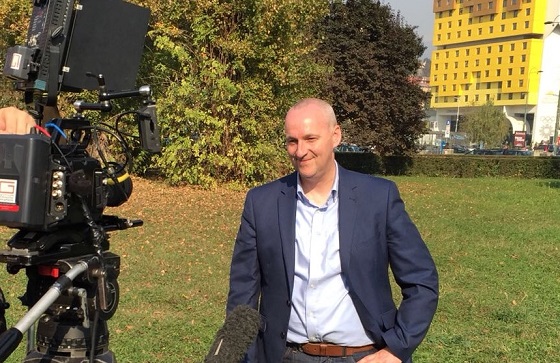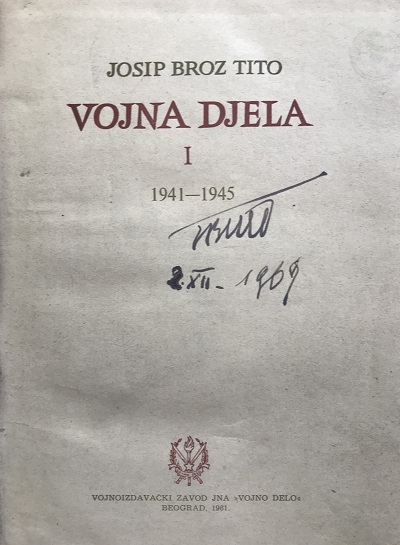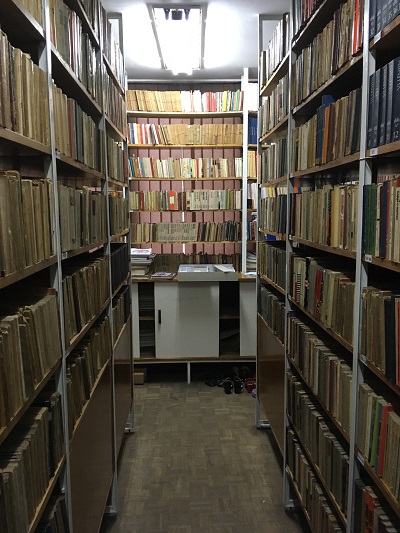A world-renowned expert on the history of the Balkans is leading a project to build a permanent exhibition inside the iconic ‘frontline hotel’ that became a base for foreign correspondents to report on the three-and-a-half-year siege of Sarajevo.
Kenneth Morrison, Professor of Modern Southeast European History at De Montfort University Leicester (DMU), has established the Hotel History Foundation in partnership with Boba Lizdek, who is the Bosnian-based co-director of the foundation.
Located in Sarajevo, the foundation will build the exhibition with the help of Project V Architecture, and will bring the remarkable history of the iconic Holiday Inn hotel - now called the Hotel Holiday – to life for its many visitors.

Professor Morrison being filmed in front of the iconic hotel in Sarajevo
The hotel was built in advance of the 1984 Winter Olympics and housed members of the International Olympic Committee and royalty during the games.
But its global reputation was established during the 1992-95 Bosnian War when the Holiday Inn was not only within siege lines, but just a few hundred meters from the frontline, located on what became known as “Sniper Alley”.
The hotel remains familiar to many who can recall the nightly news reports filed from there at the height of the war when it became a base for the world’s media.
Professor Morrison said: “This permanent exhibition is not a celebration of war, it is about the building’s 35-year history, the people who worked there and the many guests who came and went during a remarkable four decades.
“As well as items from the war, such as journalist’s flak jackets and satellite phones, we will also have items from the hotel and its guests, such as casino chips that were won and lost there.
RELATED NEWS
Be inspired. Come to our next DMU Open Day
Professor consulted and interviewed for documentaries on 'War Hotels'
House of Lords calls on Professor's Balkans expertise
“This building could only have been constructed in a specific place at a specific time. It is distinctly ‘Yugoslav’ and built during a period where Yugoslav architects had a significant degree of creative freedom. Some people find it ugly. I think it is beautiful.”
Professor Morrison has dedicated a lot of time, in between his teaching and research at DMU, to see the exhibition come to fruition. The project has been partly funded by DMU’s Faculty of Arts, Design and Humanities’ Research and Innovation Fund.
He added: “We have completed the design for exhibition space, have gathered and itemised all of the exhibits and we are now actively raising the funds to complete the build. It is exciting but fundraising is time-consuming and quite stressful. But we all believe so much in the project that we’ll find a way!”
The team working with Professor Morrison have also uncovered some real gems for the exhibition.
Professor Morrison said: “The Foundation has gathered an incredible number of exhibits that help us tell the story of the building.
“The highlight, however, was being able to track down the hotel's original knjiga utisaka (book of compliments or guest book) that covered the period from the 1984 Winter Olympics to the first few months of the siege of Sarajevo.
“It had been smuggled out of the hotel and the city by the renowned CNN cameraman, David Rust, in 1992 during a period of particularly heavy shelling.
“When David, who is himself an avid collector, heard about our project he got in touch and told me he would like to give it to the foundation so that it could be returned to its rightful home.
“It was wonderful to be able to return this piece of history back to the hotel and to the city of Sarajevo, where it belongs.
“The book has suffered some water damage and is fragile. It can’t be handled without great care, so we intend to exhibit it and make it accessible by digitising its contents and making them available to the public who visit the exhibition.
“So much was lost to the war and it is amazing this has survived.”

President Tito's signature on a copy of 'Vojna Djela'
There was a further unexpected discovery when Professor Morrison spent a day in Sarajevo working with Elma Hodžić, the curator of the History Museum of Bosnia & Herzegovina.
The two, who have written an academic article about the history of that institution, were reading through old copies of Bosnia's then only daily newspaper, Oslobodjenje, about the visit to the museum by the Yugoslav President, Josip Broz Tito, in December 1969.
Professor Morrison said: “We came across a small article in the newspaper saying that upon Tito's visit to the museum he had personally signed his three-volume collection called Vojna Djela.
“We both looked at each other and wondered whether they still existed and, would you believe it, after a long search through the library collection we found the signed copies!”
The museum, like the Holiday Inn, was located on the infamous 'Sniper Alley' and the entire collection had to be moved into the damp and cold basement during the siege of the city.
The small staff who remained in Sarajevo during the siege continued to come to work every day in dangerous and difficult circumstances to protect the building and its valuable collections

The old library shelves where Tito's three volumes were found
According to Elma Hodžić, finding the signed copies of the three-volume book was a magical moment. She said: “The museum had no idea these signed copies still existed. They were not catalogued and were thought to have been destroyed or stolen during the war. When we found them, we were literally jumping around the library in joy and disbelief.”
Professor Morrison’s expertise in Balkan history saw him called to guide the House of Lords International Relations Committee on the shaping of Britain’s post-Brexit policies in the region.
As Specialist Adviser, he played a key role in advising the committee, travelling with them and participating in high-level meetings with heads of government, drafting questions for witnesses during evidence-taking sessions and collating written evidence submitted to the inquiry.
Professor Morrison has written a book "Sarajevo's Holiday Inn on the Frontline of Politics and War" which gives staff and journalist accounts of the war. He was also the script consultant and interviewee for the recent Al Jazeera series ‘War Hotels’.
Posted on Friday 15 November 2019